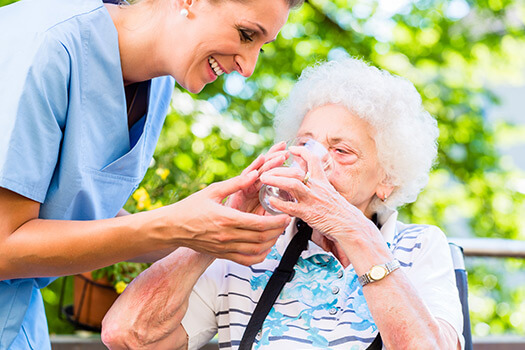Managing the ladies and gents you support with Dysphagia and ensuring that they maximise on the correct levels of hydration represents a huge challenge to care managers and their teams, given that these residents are at high risk of being deficient due to finding it difficult to tolerate large volumes of fluids.
And Dysphagia is known to affect between 53%-74% of nursing home residents. It may occur in people who have a Dementia, stroke, Motor Neurone disease and other neurological conditions.
So to help you, we’ve created a new page on our website, dedicated to Managing Dysphagia and providing a range of #fitforpurpose product solutions to help you solve your challenges and improve quality of life and wellbeing for people living with dysphagia.
- Safe drinking solutions
- Solutions to prevent choking
- Improving quality and appearance of pureed meals
- Solutions to keeping meals warmer for longer
- Solutions to provide safer oral care
- Solutions to stimulate taste and smell
It can be challenging to assess hydration in older people however you can look out for these signs and symptoms:
Signs of dehydration
- Dryness of the mouth, lips and tongue
- Sunken eyes
- Dry inelastic skin
- Drowsiness, confusion or disorientation
- Dizziness and low blood pressure
Dehydration is also indicated with a reduced and more concentrated urine output. As a general rule, the colour of urine can be a useful guide; urine that is odourless and pale in colour generally indicates good hydration, dark strong smelling urine is a common symptom of dehydration. However, there are a number of medical conditions and certain medications that can add colour to urine.
Monitoring fluid intake is a good guide to ensuring good hydration.
The key to maintaining hydration for people with Dysphagia is to promote safe swallowing and to ensure that the fluids are of the appropriate texture and thickness.
Advice on safer swallowing for improved hydration
- Ensure your resident is always sitting upright at 90 degrees when drinking.
- Do not give them drinks when slouched or lying down
- Encourage small sips of fluid and discourage gulping
- Make sure they have swallowed a drink before taking more in
- Prevent people from using drinks to wash down food.
Other strategies to help improve hydration include:
- Thickening fluids for safer swallowing
- Correct positioning
- Drinking smaller quantities with each sip:
- Investing in specialist Dysphagia drinking devices
Thickened fluids
One way of helping patients with swallowing problems to take fluids without aspirating is to consume liquid of a thicker consistency. A speech therapist can give advice about thickened fluids. Fluid can be thickened artificially with powder or bought pre-thickened.
Positioning
The adopted position for drinking can also effect swallowing. A study showed that: “The chin down posture can have a positive effect on swallowing safety and reduce the incidence of aspiration and depth of penetration, in the context of cup drinking with thin liquids.” – Fraser (2012
Drinking smaller quantities with each sip
Sometimes residents with learning difficulties or Dementia may gulp fluid too quickly, risking aspiration. It is possible that limiting the amount of fluid consumed with each swallow can also make swallowing safer.
Choosing specialist Dysphagia drinking devices for safer hydration
We provide a range of drinking devices which restrict the volume of fluid delivered and allow safer independent drinking for people living with Dysphagia.
- Our Internal Coned Mug – the clever cone shaped interior, which tapers towards the bottom and looks like an ice cream cone enables people to drink independently without having to tilt their head backwards. Even people who are bed-bound or have limited movement in the neck and arms can satisfy their thirst. And in contrast to the nose cut-out cups that are often used for people with physical limitations, these mugs are also intuitive to use and require no explanation
- Our Wide Spout Lid for Thickened Fluids (works with coned mug above) Suitable for use with thicker fluids, this long spout means your residents with limited mobility don’t have to tilt their heads back to drink.
- Our Drink-Rite Cup is an ideal choice for ladies and gents who can’t tolerate thickened fluids and is a safer option for people with learning difficulties and Dementia to prevent gulping as it provides only a small, controlled volume of fluid into the mouth (either 5 or 100cc) at a time.
- Our Dysphagia Cup is oval in shape to help accommodate the nose which prevents the need to tilt the head back and the safer chin tuck position can be adapted. It is also weighted to help reduce spills for those with tremors, with an optional base.
For more information or to arrange to see samples of our range of drinking vessels to help support your residents with Dysphagia, please contact our Sales team at sales@hcsuk.co.uk.



